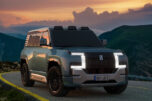Ford, LG Solution battery plans in Turkey dismantled
Scrapping of joint venture with Koc Holding blamed on EV adoption rate The joint venture between Koc Holding, Turkey’s largest industrial conglomerate, US automaker Ford and South Korean battery manufacturer LG Energy Solution to build a battery plant for commercial electric vehicles near Ankara is not going ahead. “Considering the current pace of electric vehicle...

Scrapping of joint venture with Koc Holding blamed on EV adoption rate
The joint venture between Koc Holding, Turkey’s largest industrial conglomerate, US automaker Ford and South Korean battery manufacturer LG Energy Solution to build a battery plant for commercial electric vehicles near Ankara is not going ahead.
“Considering the current pace of electric vehicle adoption, the timing is not appropriate for a battery cell investment,” Koc Holding said in a filing adding that it would now concentrate on EV production at its Kocaeli plant, a joint venture with the Turkish unit of Ford.
Koc Holding, which also owns large stakes in domestic automaker Tofaş (with Stellantis), becomes the latest firm to put on hold expansion plans.
At the beginning of October, Ford halted construction of its massive BlueOval Battery Park in the US state of Michigan, barely seven months after announcing the $3.5 billion project.
Two weeks ago, Volkswagen put on hold a fourth battery factory in Europe indefinitely. Europe’s largest carmaker is now advancing only three of the six plants announced by its newly-created PowerCo subsidiary in March 2021.

Despite the latest new, Turkey may still get a keystone EV investment. In September, President Tayyip Erdogan asked Tesla CEO Elon Musk to build a factory in the country when the pair met in New York. Musk said in May a decision on a new gigafactory will be made before the end of the year.
Turkey EVs off to the races
Turkey is one of the fastest growing EV markets globally albeit from a low base. From January through August 2023 more than 30,000 full-electric and hybrid passenger cars were registered in the country, a six-fold jump compared to the same period in 2022.
In August, EVs represented nearly 9% of all new vehicles sold in Turkey. Full electric cars (BEV) made up 63% of the domestic EV market and plug-in hybrids (PHEVs) made up the bulk of the remainder.
Turkish electric carmaker Togg, which only opened its assembly plant in October 2022, is off to a great start with its medium sized full-electric SUV, the Togg T10X.
Based on data from the Adamas Intelligence EV Battery Capacity and Battery Metals Tracker, the T10X has cornered 17% of the domestic market in terms of overall battery capacity deployed during the first eight months of the year, an achievement considering Togg only began shipping the model in May.
Siro, Togg’s joint venture with China’s Farasis Energy, supplies batteries to its expanding model line-up. Based on battery capacity deployed so far this year, the AI Tracker shows Turkey sits outside the top 20, just behind Taiwan but ahead of countries like Poland, Mexico and Brazil.
Adamas take:
Globally, EV sales are booming – up 35% so far this year so far over 2022 – and battery capacity deployed is expanding at an even quicker pace. However, the tens of billions of dollars of investment in new production pledged by automakers and cell suppliers in recent years may have run ahead of even the loftiest predictions as higher interest rates and inflation see many prospective EV buyers postpone decisions.





